#american association of physics teachers
Text
#pssssst#i'm featured in a thing#hehehe#physics#physics teaching#aapt#american association of physics teachers#membership spotlight
1 note
·
View note
Text


via the Arkansas Advocate
it’s official: in Arkansas, library staff may now be charged with a Class D felony for providing books to their communities that are deemed “obscene”.
in Florida, school librarians and teachers can be criminally charged for checking out books to kids that dare to touch on LGBTQ topics & gender identity, thanks to the “Don’t Say Gay” bill.
book censorship in the US is at such an all-time high, book sanctuaries are popping up all over the country.
library staff aren’t physically safe, either. just over the past couple months, threats against libraries and their staff resulted in the temporary closure of “five public library systems due to bomb and shooting threats," ALA. active shooter trainings have become the new norm for me.
the censorship myself and my colleagues have been watching unfold over the last several years has felt like watching a slow-motion car crash.
but this bill? this feels like a death knell for my profession.
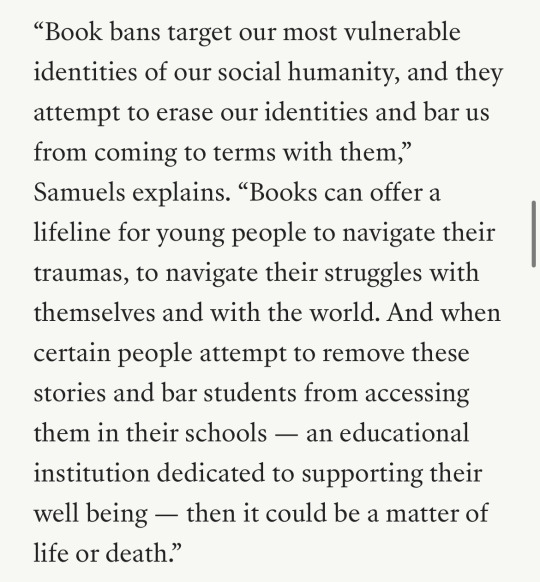
via Teen Vogue
when I was a confused queer kid growing up in an ultra-religious household, the library was my refuge. when I asked hard questions, librarians listened and gave me the tools I needed to answer them. in many ways, libraries saved my life. it's why I became a librarian.
I can't believe I'm living in times where future generations of kids may not have access to the same refuge I did, but it's happening.
if you live in the US and you care about protecting open, equitable access to information, please check out the American Library Association for anti-censorship resources in your state, info on contacting your representatives, etc.
you can also report censorship you see in your community and ALA will investigate (1-800-545-2433, ext. 4266; [email protected]).
I know this isn't my usual content, but libraries are standing on the edge of a horrifying precipice- one we can't escape on our own.
libraries are free society's canary in the coal mine, and all the alarms are singing. when libraries fall, nations usually aren't far behind.
this matters- and we need help.
#censorship#book banning#libraries#banned books#arkansas#florida#public libraries#school libraries#librarians#american library association#american libraries#lgbtq+#lgbtq+ history#us politics#homophobia#transphobia
8K notes
·
View notes
Text
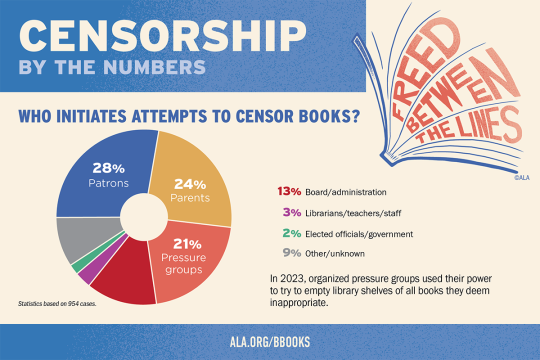


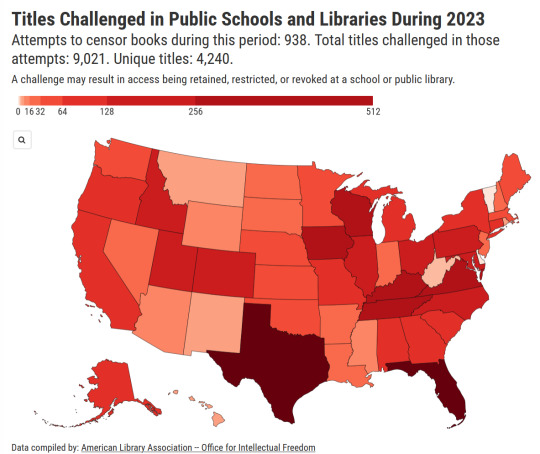
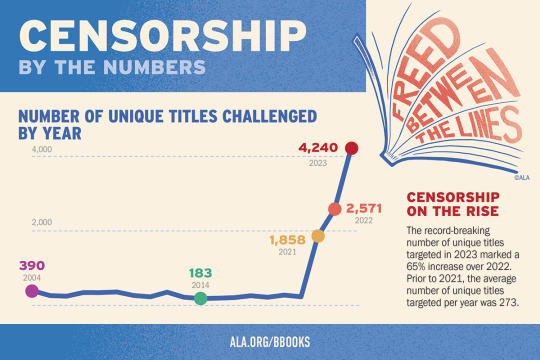
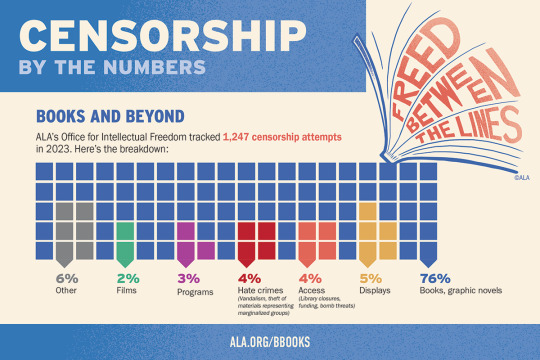
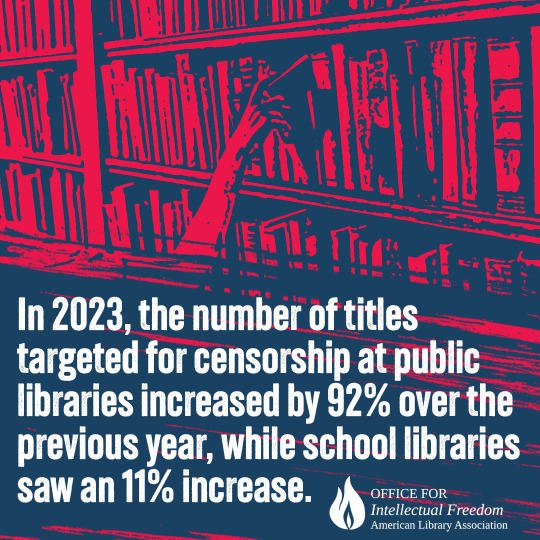
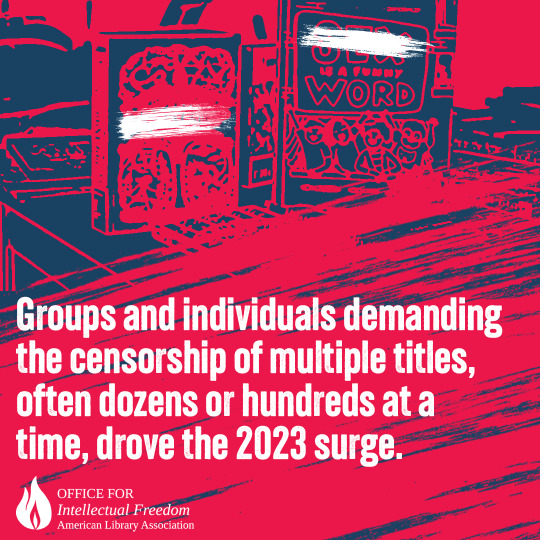
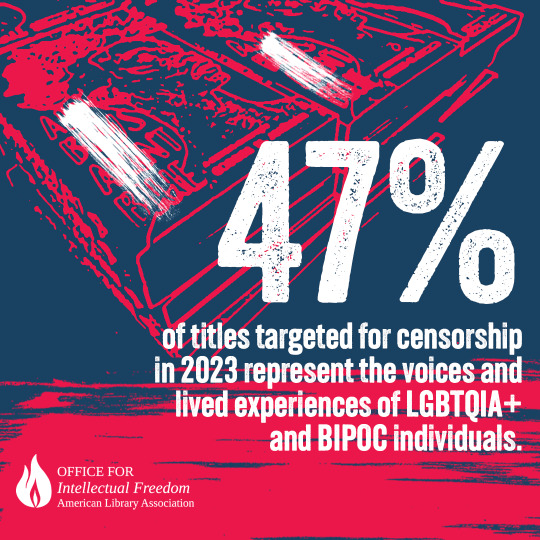
The ALA's State of America's Libraries Report for 2024 is out now.
2023 had the highest number of challenged book titles ever documented by the ALA.
You can view the full PDF of the report here. Book ban/challenge data broken down by state can be found here.
If you can, try to keep an eye on your local libraries, especially school and public libraries. If book/program challenges or attacks on library staff are happening in your area, make your voice heard -- show up at school board meetings, county commissioner meetings, town halls, etc. Counterprotest. Write messages of support on social media or in your local papers. Show support for staff in-person. Tell others about the value of libraries.
Get a library card if you haven't yet -- if you're not a regular user, chances are you might not know what all your library offers. I'm talking video games, makerspaces (3D printers, digital art software, recording equipment, VR, etc.), streaming services, meeting spaces, free demonstrations and programs (often with any necessary materials provided at no cost!), mobile WiFi hotspots, Library of Things collections, database subscriptions, genealogy resources, and so on. A lot of electronic resources like ebooks, databases, and streaming services you can access off-site as long as you have a (again: free!!!) library card. There may even be services like homebound delivery for people who can't physically come to the library.
Also try to stay up to date on pending legislation in your state -- right now there's a ton of proposed legislation that will harm libraries, but there are also bills that aim to protect libraries, librarians, teachers, and intellectual freedom. It's just as important to let your representatives know that you support pro-library/anti-censorship legislation as it is to let them know that you oppose anti-library/pro-censorship legislation.
Unfortunately, someone being a library user or seeing value in the work that libraries do does not guarantee that they will support libraries at the ballot. One of the biggest predictors for whether libraries stay funded is not the quantity or quality of the services, programs, and materials it offers, but voter support. Make sure your representatives and local politicians know your stance and that their actions toward libraries will affect your vote.
Here are some resources for staying updated:
If you're interested in library advocacy and staying up to date with the challenges libraries are facing in the U.S., check out EveryLibrary, which focuses on building voter support for libraries.
Book Riot has regular articles on censorship attempts taking place throughout the nation, which can be found here, as well as a Literary Activism Newsletter.
The American Library Association's Office for Intellectual Freedom focuses on the intellectual freedom component of the Library Bill of Rights, tracks censorship attempts throughout each year, and provides training, support, and education about intellectual freedom to library staff and the public.
The Electronic Frontier Foundation focuses on intellectual freedom in the digital world, including fighting online censorship and illegal surveillance.
I know this post is long, but please spread the word. Libraries need your support now more than ever.
110 notes
·
View notes
Text
Strawhat Real World Jobs
Yes Oda did give out alternate jobs for all the strawhats in an SBS but I will die before I accept Zoro as a cop and I have a few other quibbles and elaborations I'd like to put forth for Modern AUs. I want you to keep in mind that I'm writing this from a distinctly US American point of view so some of the job cultures may be slightly different to your locality.
Luffy- Firefighter: this one is correct. Luffy needs a job that is highly physical with low organization and intelligence requirements (sorry) This man is not going to college. He isn't a hero but there's no other legal way to get the adrenaline rush he needs. Also firefighters have a higher tolerance for fistfighting than other jobs, but not as much as construction. I think he could do construction labor if needed but I also think he would get bored. He would also be a PR nightmare as a professional athlete or wrestler. Could make it as a YouTuber but only if someone else edited his videos. Honestly YouTuber Luffy is your best choice if you want to preserve the feel of canon in a modern world.
Zoro- Cop: I'm sorry Oda but this is dumb as shit. Zoro would get asked to serve an eviction to a struggling mother of three or clear out a homeless encampment and quit on the spot. Or he would get into fights with other cops and get walled out and have to quit. He could still be a swordsman as a professional Kendo fencer? Athlete? Idk what they call those but he'd go on the pro circuit and absolutely decimate. He'd teach at a dojo in the off seasons. I'd also see him as an athletic trainer. I think Zoro could make it through college
Nami- Nursery School Teacher: While Nami is canonically very fond of children and quite good with them this feels like kind of a cop out. I think meteorologist suits her skills really well and I think she could kill it in the looks contest that weather anchors have to play.
Sanji- Stylist: I love this one so much. Idk what the original was but a stylist in the US refers to either a personal stylist which is a person who picks rich people's outfits or a hair stylist which is a person who cuts and styles hair, usually women's. Both jobs are associated with flamboyant gay men. He goes to his job and he gasses up women and calls men ugly for eight hours and then comes home and cooks Luffy dinner because he got texted a picture of the most fucked up eggs you ever did see that morning.
Ussop- Graphic Designer: I honestly have no notes. Yeah Ussop can hold down a steady job, and yeah it should be art focused. What is art but lying anyway?
Chopper- Grade School Teacher: This one is just so cute. He's got a childishness to him that makes kids like him and he has a soft caring personality that makes him good at his job. He can also be strict when he really has to. I agree Chopper would be a great elementary school teacher
Franky- Pilot: I guess? The thing is I think flying a plane for a job is both stressful and boring and I honestly don't think it suits him as well as say mechanic. I think Franky would be great as a mechanic souping up hot rods and doing weird custom jobs and he would be very entrenched in the local car scene. I also do just love mechanic characters
Robin- Flight Attendant: We all know this is just for Frobin reasons. And while the idea of a hand sprouting from your fold down tray to serve you your in flight meal is charming Robin deserves better than being Franky's beautiful assistant. Also I don't wish customer service upon her after all her suffering. I think she would be a great lawyer. She's smart, she's eloquent, she's poised- she'd kill it in the courtroom. She does corporate law for Crocodiles unethical company for a ridiculous sum before quitting to start her own firm and defending Luffy's numerous aggravated assault charges cause she likes him.
Brook- Detective: I'm not really sure why they picked this but I now want a detective story where Brook runs around solving mysteries (wait isn't that just skullduggery pleasant?)
Jinbe- Train Station Attendant: This is really cute, but we all know he'd be a retired yakuza boss. Maybe in some wild world where none of the strawhats turn to crime. I think he would be a local institution and know a lot of people and ask them about their families and such
#strawhat pirates#one piece headcanons#one piece strawhats#straw hat pirates#mine#i kinda ran outta steam with jinbe#sorry jinbe#My writing
71 notes
·
View notes
Text
A.B.A. is the only autism intervention that is approved by insurers and Medicaid in all fifty states. The practice is widely recommended for autistic kids who exhibit dangerous behaviors, such as self-injury or aggression toward others, or who need to acquire basic skills, such as dressing themselves or going to the bathroom. The mother of a boy with severe autism in New York City told me that her son’s current goals in A.B.A. include tolerating the shower for incrementally longer intervals, redirecting the urge to pull on other people’s hair, and using a speech tablet to say no. Another kid might be working on more complex language skills by drilling with flash cards or honing his ability to focus on academic work. Often, A.B.A. targets autistic traits that may be socially stigmatizing but are harmless unto themselves, such as fidgeting, avoiding eye contact, or stereotypic behaviors commonly known as stimming—rocking, hand-flapping, and so forth.
Hammond is now the mother of two autistic sons. Her older son, Aidan, who is sixteen, is nonverbal and needs round-the-clock care. When he was young, he attended a traditional school, but teachers, Hammond said, “were literally calling me every single day: ‘Can you please come here and sit with him? Can you please pick him up?’ ” Hammond tried physical, occupational, and speech-language therapy for Aidan, but he was “kicked out of every single one,” she said. Therapists “felt that his behaviors were interfering with his learning, and that he needed to be in A.B.A.” A.B.A. clinicians, she added, “were at least willing to look at my son.”
She drove him to A.B.A. appointments at a clinic about an hour from their home in southwest Texas, but stopped treatment after just a few sessions. This was partly due to the commute and the co-pay, but also to a discomfort with the approach, which required Aidan to spend long periods, over multiple sessions, solving a puzzle in which he matched shapes to the right-sized holes. “He’s having to do this over and over and over again,” Hammond recalled, “and, when he picked the right thing, it’s, like, Ooh, here’s a Skittle! Like he’s a puppy.”
In recent years, A.B.A. has come under increasingly vehement criticism from members of the neurodiversity movement, who believe that it cruelly pathologizes autistic behavior. They say that its rewards for compliance are dehumanizing; some compare A.B.A. to conversion therapy. Social-media posts condemning the practice often carry the hashtag #ABAIsAbuse. The message that A.B.A. sends is that “your instinctual way of being is incorrect,” Zoe Gross, the director of advocacy at the nonprofit Autistic Self Advocacy Network, told me. “The goals of A.B.A. therapy—from its inception, but still through today—tend to focus on teaching autistic people to behave like non-autistic people.” But others say this criticism obscures the good work that A.B.A. can do. Alicia Allgood, a board-certified behavior analyst who co-runs an A.B.A. agency in New York City, and who is herself autistic, told me, “The autistic community is up in arms. There is a very vocal part of the autistic population that is saying that A.B.A. is harmful or aversive or has potentially caused trauma.”
Until recently, the American Medical Association officially endorsed “evidence-based treatment of Autism Spectrum Disorder including, but not limited to, Applied Behavior Analysis Therapy.” Last summer, the medical students’ body of the association proposed that the organization withdraw its support for A.B.A., citing objections by autistic self-advocates. The association did not adopt the resolution as submitted, but its house of delegates eventually approved an amendment removing any explicit reference to A.B.A., and autistic activists spread the word that A.B.A. no longer appeared to have the outright endorsement of the nation’s largest medical society.
13 notes
·
View notes
Photo


The Secret Lobotomy of Rosemary Kennedy
On September 13, 1918, Rose Kennedy, wife of prominent businessman Joseph Kennedy Sr., went into labor with her third child. Rose's obstetrician was called to the Kennedys' home, but with a pneumonia epidemic raging through Boston, he failed to arrive before the baby entered the birth canal. A nurse, desperate to stop the delivery until the doctor arrived, held Rose's legs closed. When that failed, she reached into Rose's birth canal and held the baby's head in place for an unbelievable two hours.
In the quickly expanding household of boisterous, competitive Kennedys, Rosemary was often left behind. She was held back in school, until finally Rose hired private tutors for Rosemary and kept her at home. Watching her brothers and sisters go out without her left Rosemary angry and confused. She had "fits," which could have been seizures or episodes of mental illness. Afraid of Rosemary's vulnerability, Rose never let her leave the house alone. Rosemary also often ran away.
In the 1920s, the stigma associated with mental disability could ruin a family. Many Americans, including prominent members of society like Teddy Roosevelt, Andrew Carnegie, and John D. Rockefeller, believed in eugenics, a pseudoscience that advocated for forced sterilization of the "defective," a group that included the mental and physically disabled. And then, of course, the Kennedys were devout Catholics, whose church deemed disability the result of sin—a punishment from God.
Rosemary's disability was a challenge her mother couldn't face alone. At age 11, Rosemary was sent to boarding school. Over the next nine years, she attended five different schools. Her letters home show a young girl struggling to get it right. She wrote in a childish script that slants down dramatically off the page. She misspelled words and wrote incomplete sentences. Each letter is filled with a daughter's a desperate desire for approval and affection.
While in Britain, Rosemary found brief respite. She was enrolled in Belmont House, a boarding school run by Catholic nuns who embraced the Montessori Method of education, which focused on learning through practical skills and hands-on activities. Rosemary flourished under the guidance of the nuns, who trained her to be a teacher's aide. But after the Germans marched on Paris in the summer of 1940, her family brought her back to the States. Rosemary's reprieve was over.
Back at home, Rosemary watched her siblings begin their lives and careers, while she wasn't even allowed outside alone. Rose tried to find another school for her daughter, but few places were equipped to take a disabled adult in her 20s. Rosemary was eventually sent to a convent, where she began sneaking out at night and going to bars.
Joe Sr. was busy plotting the political career of his two oldest sons. Wanting to avoid scandal and looking to find a cure for his daughter's erratic behavior, he began speaking to Dr. Walter Freeman and his associate Dr. James Watts, the leading practitioners of lobotomies in America. At the time, the procedure was heralded as a cure for the physically disabled and mentally ill..
Joe Sr. discussed the procedure with Rose, who asked their daughter Kathleen to look into it. Kathleen spoke with a reporter, John White, investigating mental illness and treatments. White told Kathleen that the effects of lobotomies were "no good." Clifford Larson writes that Kathleen immediately reported back to her mother: "Oh, Mother, no, it's nothing we want done for Rosie." But whether out of desperation or determination, Joe Sr. went ahead with the surgery.
At the age of 23, Rosemary was admitted to George Washington University Hospital, where she was strapped to a table and given an anaesthetic to numb the areas of her brain where Freeman and Watts would drill two small holes. They then inserted a small metal spatula and sliced the connections between her pre-frontal cortex and the rest of her brain. (Freeman often used ice picks for the procedure, hammering the pick in through the eye socket.) Rosemary was wide awake the whole time. The doctors had her recite poems as they cut—when she was silent, they knew the procedure was complete.
The hope was that the procedure would subdue Rosemary and end her rebellious jaunts about town. But the result was far more extreme: After the lobotomy, Rosemary was no longer able to walk or talk. It took months of therapy before she regained the ability to move on her own, recouping only the partial use of one arm. One of her legs was permanently turned inward. Months after the surgery, when she regained her ability to speak, it was a mix of garbled sounds and words. The result must have been shocking to Joe Sr., who had clung to the procedure as his last hope for Rosemary. But it couldn't have shocked Dr. Freeman, who had no surgical training and no proof of the astounding results he had claimed.
Immediately after the surgery, Joe Sr. moved Rosemary to Craig House, a psychiatric care facility where Zelda Fitzgerald once stayed. At the end of the 1940s, Joe Sr. had her moved to Saint Coletta's, a residential care facility in Jefferson, Wisconsin, where Rosemary lived until her death in 2005.
For 20 years, Rosemary was hidden from her family.
In 1961, Joe Sr. suffered a stroke, and in early 1962, Rose finally saw her daughter again. Koehler-Pentacoff, whose aunt was one of Rosemary's primary caretakers at Saint Coletta's, recalls being told that during their first meeting, Rosemary attacked her mother. Angry, wounded, and abandoned, Rosemary was fighting for herself.
Twenty years after the barbaric procedure that derailed Rosemary's life, the Kennedys began to fight for her too. Rosemary's sister Eunice Kennedy Shriver founded the Special Olympics in 1968 and became a leading advocate for disability rights. Rosemary's nephew Anthony Shriver became an activist for people with developmental disabilities and founded the non-profit Best Buddies International. Rosemary's older brother John F. Kennedy, who became the 35th president of the United States, signed the Maternal and Child Health and Mental Retardation Planning Amendment to the Social Security Act, the first major legislation to combat mental illness and retardation, in 1963. It was a precusor to the American's with Disabilities Act, which Rosemary's little brother Ted—who served as a Democratic Senator for Massachusetts from 1962 until his death in 2009—championed. (It was eventually made law in 1990.) Ted Kennedy also sat on the board of the American Association of People with Disabilities.
92 notes
·
View notes
Text
Excerpt from this story from Inside Climate News:
In the U.S. and around the world, the impact of climate change on primary education is becoming increasingly difficult to ignore, both inside and outside the classroom. As heat and flooding threaten the physical environment, pedagogical—and political—debates rage over how and what to teach students about their rapidly warming planet.
Often a reflection of the political majority in a state, climate curriculums vary across public schools in the U.S., and now students themselves are advocating for more climate change education. However, these efforts have been met with mixed responses from school boards and state legislatures.
Today, I am diving into the student-led push to expand climate change instruction across classrooms as schools struggle against the most severe climate impacts.
In the U.S., students are speaking out to learn more about the source of the climate impacts hitting their schools. But their efforts haven’t always been met with support.
In February, dozens of high school and college students attended a hearing in the Minnesota Capitol in St. Paul to advance a bill that would require schools to integrate climate change into their curriculums, the Associated Press reports. However, the bill was not moved forward, similar to one that New Hampshire high schoolers were advocating for in March that is now indefinitely stalled.
Oftentimes, classroom materials do not reflect current climate science. In August, Republican Gov. Ron Desantis approved a move which allows classrooms to show videos that reject the reality of climate change. Several recent studies show that while science textbooks discuss climate change, they have not kept pace with the body of new research on the subject, a trend that my colleague Kiley Bense reported on last year.
In a recent investigation, Rolling Stone magazine and Drilled revealed that the oil and gas industry has given funding to push forward corporate goals into lesson plans produced by Discovery Education, a textbook and multimedia education provider used by half the classrooms in the U.S. In one of their lessons, which includes a logo from oil and gas lobbying organization the American Petroleum Institute, the plan advises teachers to “tell the class that in 2020, petroleum powered 90 percent of the country’s transportation.” It does not include any mention of renewable energy or climate impacts from oil-related emissions, the news outlets found.
However, other states have embraced climate change curriculums across public schools. In 2020, New Jersey became the first state to require teaching climate change at all grade levels in all subjects, from art class to physical education. Since the program began, many teachers have focused on helping kids connect with nature and brainstorm climate solutions, reports The New York Times.
7 notes
·
View notes
Text
Creelarke, Camp, and Wet Hot American Summer
So, Wet Hot American Summer is on the S4 board:

It’s got Ben and McKinley, two camp counsellors who are very gay for eachother and are revealed to have been a couple the entire time:
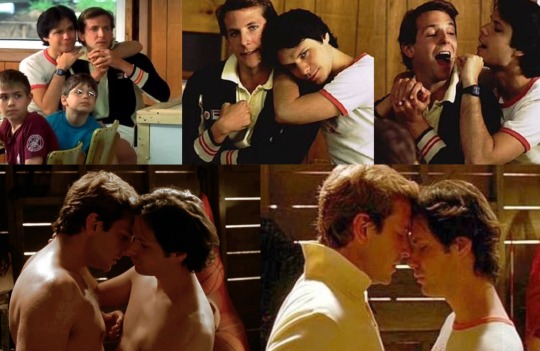
And maybe it’s just me, but don’t these two look a little familiar?

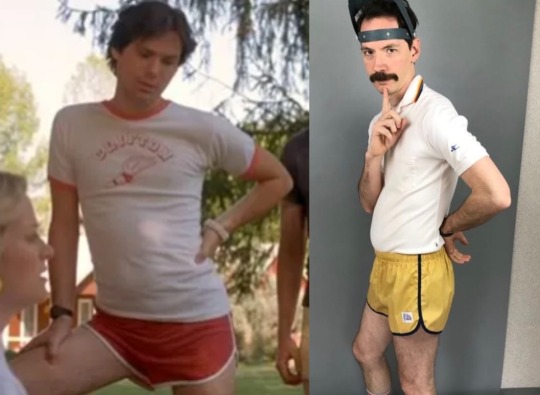
And take a look at Mckinley’s watch- doesn’t it also look familiar?
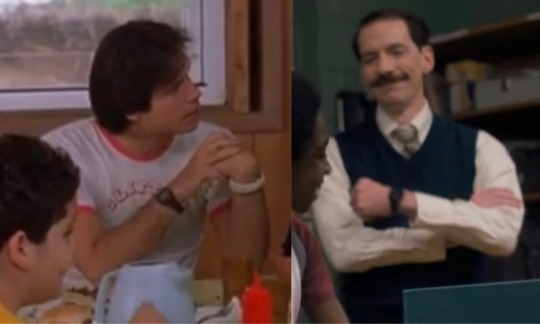
And the fact that both Ben and McKinley are camp counsellors/teaching kids whereas Scott and Henry are both teacher figures/teachers.
And speaking of summer camp, remember Petey McHew?
Petey McHew, who went to summer camp? And was told the legend of Victor Creel? And who is connected to all of the Creel imagery?
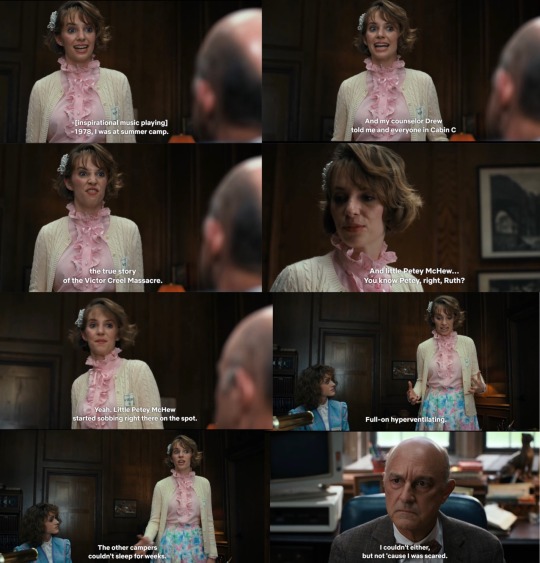
And Peter Ballard being the casting name of Henry? Therefore connection Henry and Petey, especially with all of Petey's narrative ties to the Creels, which then connects Henry to summer camp?
But who else is referenced as having gone to camp?
Scott Clarke. Although not summer camp, in the comics (the Tomb of Ybwen specifically), Scott is said to have gone to boy scout camp with Bob (this comic snippet is Scott talking):
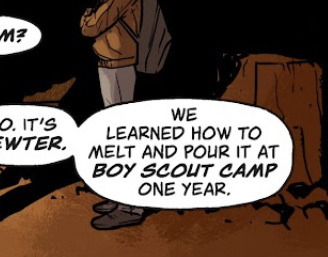
And who ELSE went to camp?
Dustin! Camp Know-Where. Which, when we look at the scenes regarding Dustin and camp, there’s not only references that tie to Henry, but also that tie to Scott.
We have the “dreaming,” line, which ties all of the dream imagery with Henry and “dream a little dream of me”:
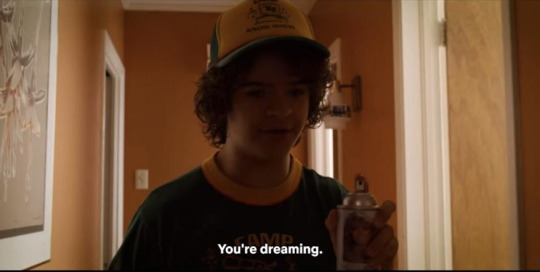
We have the Forever Clock, which, Henry and all of his clock imagery speaks for itself:
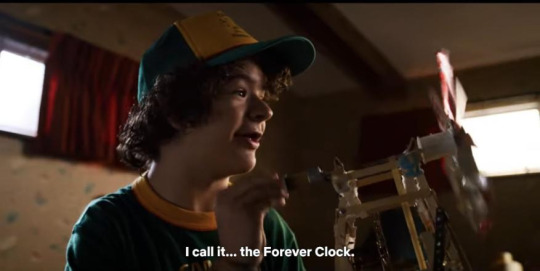
And we also have cerebro being referred to as a ham radio- and who’s always been associated with ham radios from the very begging? Scott.
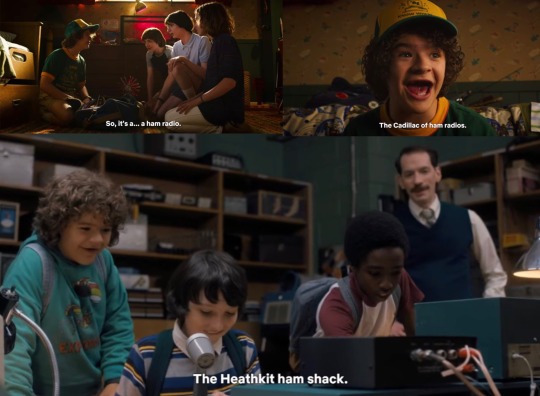
I know some people may think that the Ben/McKinney parallel is meant to be Byler (and I think it can be both byler and creelarke as the two parallel eachother), however, when we sit down and look at the evidence, there’s a few key things that point to Creelarke over Byler for me:
1.) The casting
Physically, Ben and McKinley resemble Henry and Scott far more than they resemble Mike and Will. This one basically speaks for itself, but Ben has blonde hair and blue eyes like Henry, and McKinley has dark/black hair and brown eyes like Scott.
2.) The costuming
While Mike and Scott both have watches similar to McKinely’s watch, Scott is the one with the strong costuming parallel to McKinley (Scott’s S3 shorts outfit), something that Mike doesn’t have, as although Mike wears shorts in S3, they aren’t nearly as similar to McKinley’s outfit as Scott’s outfit/shorts are.
With Scott, we get these very strong direct parallels between Scott’s costuming and McKinley’s costuming- in the season that has constant summer camp references no less.
Scott has the same cut/style of shorts as McKinley, with the coloured border, and while his shirt is a polo shirt rather than a T shirt, it’s still a white shirt much like McKinley’s.

Scott’s even posed like McKinley in that costuming test BTS pictures, which makes me wonder if they had reference pictures of McKinley pinned up to reference for Scott & Randy saw them. We know that the ST costuming dept pins costuming reference up on the wall, thanks to BTS shots like these:

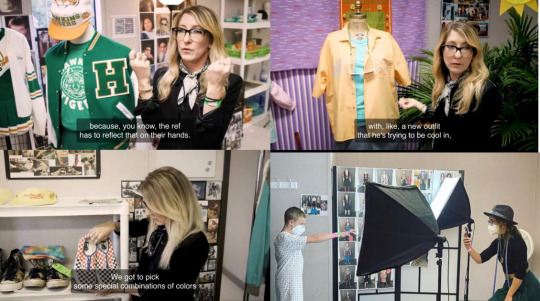
We even get parallels right down to the same sort of white and blue striped socks, the only difference being that Scott’s socks have two stripes instead of three:
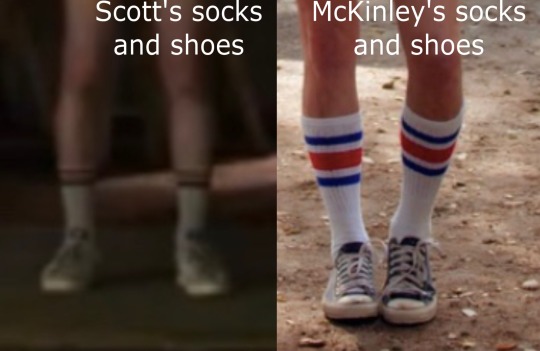
With Mike though, this is the closest we get to any of McKinley’s outfits- and even then, it’s only one outfit and a tentative parallel at best. Scott’s colour schemes are far more similar to McKinley’s and his shorts are the same type/cut as McKinley’s, unlike Mike’s, and Mike’s shorts lack the coloured border that all of Scott and McKinley’s shorts have. Mike, like Scott, also wears a polo shirt instead of a t-shirt, but none of Mike’s shirts come as close to McKinley’s shirt colours as Scott’s shirt does.
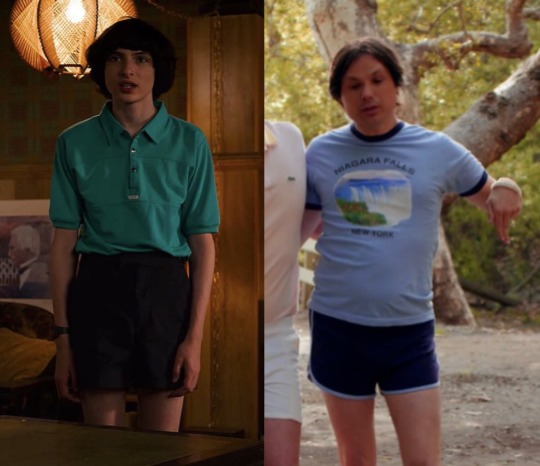
3.) The camp
Mike and Will don’t have that same sort of camp/summer camp imagery tied to them. At all. But Scott has it tied to him directly in the comics, and Henry has it via the Peter Ballard vs Petey McHew connection/the general connection of Petey McHew to the Creels.
So, long story short, I think that Scott and Henry are intentionally paralleled to McKinley and Ben from Wet Hot American Summer, and that the Creelarke vs Ben/McKinley parallel is more supported/has more evidence than the Byler vs Ben/McKinley parallel.
70 notes
·
View notes
Text
THIS DAY IN GAY HISTORY
based on: The White Crane Institute's 'Gay Wisdom', Gay Birthdays, Gay For Today, Famous GLBT, glbt-Gay Encylopedia, Today in Gay History, Wikipedia, and more … February 27



6th Century BC – Sappho, Greek lyric poet, born. Of course, this is another one of those dates that is arbitrary. Sappho was the greatest of all the early Greek lyric poets, born on the island of Lesbos. Her birth was sometime between 630 and 612 BC, and it is said that she died around 570 BC, but little is known for certain about her life. The bulk of her poetry, which was well-known and greatly admired throughout antiquity, has been lost, but her immense reputation has endured through surviving fragments. She was called "the Tenth Muse" by no less than Plato.
Sappho's poetry centers on passion and love for various personages and both genders. The word lesbian derives from the name of the island of her birth, Lesbos, while her name is also the origin of the word sapphic; neither word was applied to female homosexuality until the nineteenth century.
The female narrators of many of her poems speak of infatuations and love (sometimes requited, sometimes not) for various females, but descriptions of physical acts between women are few and subject to debate. Whether these poems are meant to be autobiographical is not known, although elements of other parts of Sappho's life do make appearances in her work, and it would be compatible with her style to have these intimate encounters expressed poetically, as well. Her homoerotica should be placed in the context of the seventh century (BC).
A tradition going back at least to Menander suggested that Sappho killed herself by jumping off the Leucadian cliffs for love of Phaon, a ferryman. This is regarded as unhistorical by modern scholars, perhaps invented by the comic poets as a sort of ironic "revenge of the gods." or the legend may have resulted in part from a desire to assert Sappho as heterosexual.

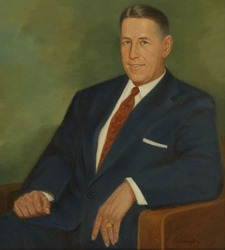
1905 – One of the most infamous hateful racist homophobes and general misanthropes Charley Eugene Johns was born on this date.(d.1990). Johns was an American politician and the thirty-second governor of Florida from 1953 to 1955. Why cover Johns? Because most of us don't know this history and it's important to know what happened so it doesn't happen again.
Johns is most remembered for his support and chairmanship of the infamous Florida Legislative Investigation Committee, nicknamed the "Johns Committee" because of Johns' chairmanship. This committee participated in the Red Scare and Lavender scare by investigating communists, homosexuals, and civil rights advocates among the students and faculty of Florida's university system. They were responsible for revoking teachers' certificates and firing university professors. By 1963, the committee had forced the dismissal or resignation of over 100 professors and deans at the University of Florida, Florida State University and the University of South Florida. One professor attempted suicide after being investigated by the committee.
The state legislature ended funding for the committee in 1964 after it released a report called Homosexuality and Citizenship in Florida, which infamously became known as the "Purple Pamphlet". Its many photographs depicting homosexual acts outraged legislators and reportedly copies of the report were being sold as pornography in New York City.
In 2005, UF Today, an alumni publication of the University of Florida, included Johns in a list of 81 "outstanding" UF alumni. Johns attended UF only for a few months and did not graduate. The editor apologized for the error, and the alumni association said that including him was a mistake.

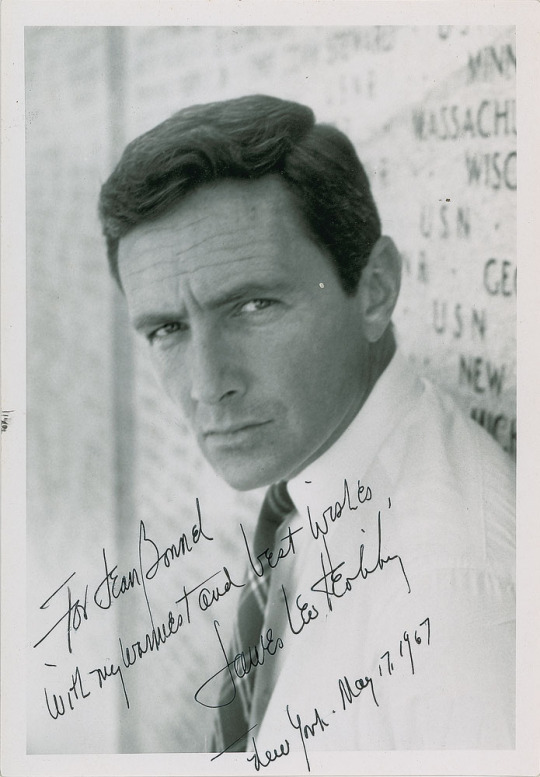
1927 – James Leo Herlihy was born on this date (d.1993). Herlihy wrote "Midnight Cowboy" and "Season of the Witch." Born in Detroit, Michigan, Herlihy attended Black Mountain College in North Carolina, a small, experimental institution whose faculty included Merce Cunningham, John Cage, Willem de Kooning, and other innovative figures in the arts. Herlihy studied art, music, and literature.
Like his close friend and mentor Tennessee Williams, Herlihy was a gay author whose works delved into taboo subjects and broke new ground for what was acceptable to major publishers. His 1958 play Blue Denim confronted teenage sexuality and abortion and was praised in a newspaper column by Eleanor Roosevelt.
Along with Williams, Herlihy became part of a circle of friends and lovers in Key West- mostly gay writers and "theater people"- that included James Kirkwood Jr., co-writer of A Chorus Line and author of cult novels and plays including There Must Be a Pony!; Evan Rhodes, the author of The Prince of Central Park; one-time singer and agent Dick Duane, to whom Herlihy dedicated two of his finest novels, All Fall Down and Midnight Cowboy; and to a lesser extent, visiting writers like Truman Capote and Gore Vidal. Author Christopher Isherwood paints the scene in an entry from his diary in August 1959: "(Broadway producer Walter) Starcke came by, en route for Japan and round the world . . . 'Now I live by grace,' says Starcke. 'I live every hour of every day to its fullest.' Actually he is in Key West, dealing in real estate and having parties with Herlihy and his friend which sometimes go on until morning. Lots of sex."
Herlihy's novels often feature protagonists living outside mainstream American culture, like Joe Buck, the male prostitute in Midnight Cowboy and Witch Gliz, the female teenage runaway in Season of the Witch. He wrote about aspects of the Gay subculture in urban America in much of his fiction. Most of his books are now out of print, although they were very popular at the time of their publication.
Herlihy committed suicide, aged 66, by taking an overdose of sleeping pills in Los Angeles.

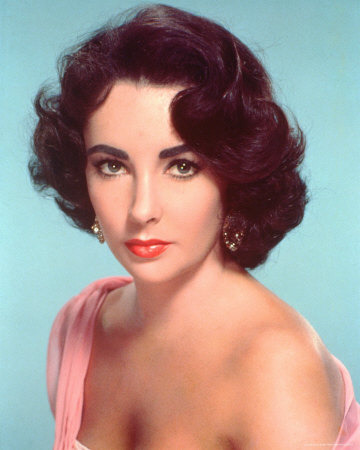
1932 – Dame Elizabeth Taylor, DBE (d.2011) was a British-American actress. From her early years as a child star with MGM, she became one of the great screen actresses of Hollywood's Golden Age. As one of the world's most famous film stars, Taylor was recognized for her acting ability and for her glamorous lifestyle, beauty and distinctive violet eyes.
National Velvet (1944) was Taylor's first success, and she starred in Father of the Bride (1950), A Place in the Sun (1951), Giant (1956), Cat on a Hot Tin Roof (1958), and Suddenly, Last Summer (1959). She won the Academy Award for Best Actress for BUtterfield 8 (1960), played the title role in Cleopatra (1963), and married her co-star Richard Burton. They appeared together in 11 films, including Who's Afraid of Virginia Woolf? (1966), for which Taylor won a second Academy Award. Her much publicized personal life included eight marriages (twice to Burton) and several life-threatening illnesses.
Taylor devoted consistent and generous humanitarian time, advocacy efforts, and funding to HIV and AIDS-related projects and charities, helping to raise more than $270 million for the cause. She was one of the first celebrities and public personalities to do so at a time when few acknowledged the disease, organizing and hosting the first AIDS fundraiser in 1984, to benefit AIDS Project Los Angeles.
Taylor was cofounder of the American Foundation for AIDS Research (amfAR) with Dr. Michael Gottlieb and Dr. Mathilde Krim in 1985. Her longtime friend and former co-star Rock Hudson had disclosed having AIDS and died of it that year. She also founded the Elizabeth Taylor AIDS Foundation (ETAF) in 1993, created to provide critically needed support services for people with HIV/AIDS. For example, in 2006 Taylor commissioned a 37-foot (11 m) "Care Van" equipped with examination tables and xray equipment, the New Orleans donation made by her Elizabeth Taylor AIDS Foundation and Macy's. That year, in the wake of Hurricane Katrina, she also donated US$40,000 to the NO/AIDS Task Force, a non-profit organization serving the community of those affected by HIV/AIDS in and around New Orleans.Taylor was honored with a special Academy Award, the Jean Hersholt Humanitarian Award, in 1992 for her HIV/AIDS humanitarian work. Speaking of that work, former President Bill Clinton said at her death on March 23, 2011, "Elizabeth's legacy will live on in many people around the world whose lives will be longer and better because of her work and the ongoing efforts of those she inspired."

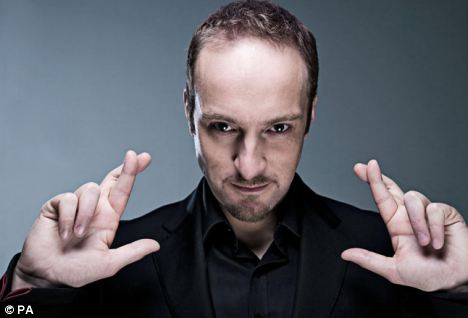
1971 – Derren Brown is an English illusionist, mentalist, painter, writer and sceptic. He is known for his appearances in television specials, stage productions, photographic memory, and British television series such as Trick of the Mind and Trick or Treat.
After studying German and Law at the University of Bristol, Derren Brown started out as a traditional conjurer specialising in close magic before moving into stage hypnotism and eventually into television on Channel 4, where he has produced several controversial series using a combination of 'magic, suggestion, psychology, misdirection and showmanship'.
Using his knowledge and skill he appears to be able to predict and influence people's thoughts with subtle suggestion, manipulate the decision making process and read the subtle physical signs or body language that indicate what a person is thinking. His sometimes disturbing shows have included Derren Brown's Mind Control, Russian Roulette, Seance, Messiah and The Heist. He often uses his skills to debunk religous, supernatural and paranormal beliefs. He has written several books on magic and tricks of the mind and regularly takes his show on tour.
Brown had been in the spotlight for several years before revealing himself to be gay in an interview in a Sunday newspaper supplement in September 2007. In an interview with the Radio Times in 2011 Brown talked more about his sexuality, stating that he is blissfully happy in a relationship. He said,
"I spent a lot of time thinking about me and working on what I wanted to be before I came into a relationship. In some ways, it's bad because you come into relationship quite late without a lot of experience and you have a lot to learn. But that can also be exciting. Certainly, it's lovely to have somebody love you and it's lovely to love someone else."


1975 – The American screenwriter and director Christopher (Beau) Landon was born today. Best known as the writer of 2007 film Disturbia and as the son of filmmaker Michael Landon.
Most of Landon's films deal with LGBT themes and issues, including $30, one of five components in Boys Life 3, a collection of short films dealing with issues faced by gays, and a spec script about the relationship between a straight man and a gay man. More recently, he has written the screenplays of the 2007 films Blood and Chocolate, The Flock and the acclaimed Disturbia. Disturbia was one of his spec scripts which was brought to Montecito Pictures and subsequently DreamWorks Pictures, and went on to become No. 1 in cinemas upon its release. Since then he has worked on The Lesson, a film for DreamWorks, and the 2007 television series Dirty Sexy Money, his first television project, eager to expand his repertoire. He has also worked on the screenplay of the film adaption of Lisa McMann's young adult novel Wake. He has recently been achieving some success as a writer on the Paranormal Activiy franchise.
Landon came out as gay in 1999 having only written the script of Another Day in Paradise, unafraid of his sexuality harming his career potential. He was aware that homophobia may have harmed his potential in the industry. "I may fall off some list because of my sexuality. But if that happens, then I really don't want to be on that list anyway," he said, speaking of homophobia in Hollywood and the film industry.
He says that growing up he was labeled a faggot by peers at his high school. His mother, a Christian, initially hesitated to accept his sexuality, but he told her, "I don't even know if I believe in God, but if I do, he gave you a gay son so that you can start confronting some of these issues and get yourself out of the box you've placed yourself in for so long." His stepmother, Cindy Clerico, his father's next wife, told him that both she and his father always suspected he was gay.

Some rather indiscreet pics which have surfaced on the internet reveal that, like his father, he is very well-hung.
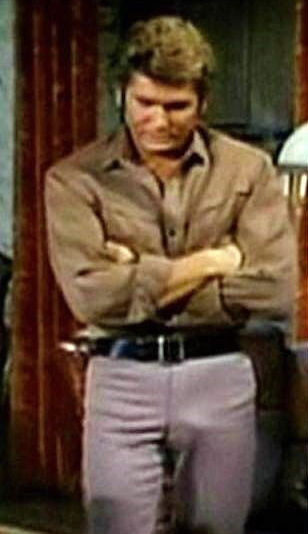
"Little" Joe

2017 – When We Rise, an ABC mini-series, premiers on this day. It was a docudrama miniseries about LGBT rights, created by Dustin Lance Black. The 45-year saga tells the evolving history of the modern gay rights movement, starting just after the Stonewall riots in 1969.



14 notes
·
View notes
Photo
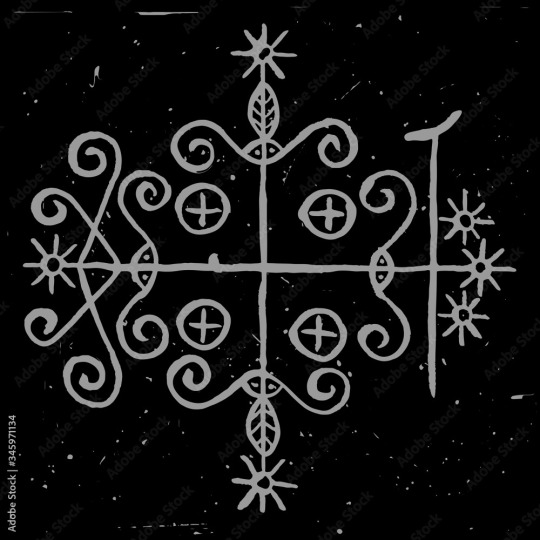

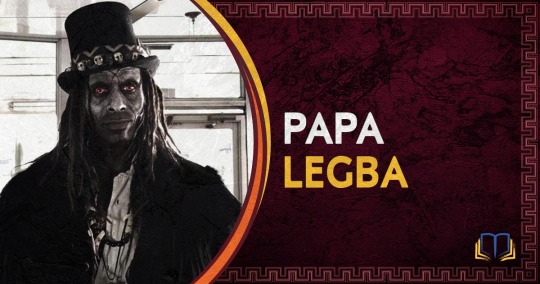
Does the Witch Doctor in Africa countries make Kabbalistic Pacts with the Devil like in Haitian Voodoo and Jamaican Obeah?
They most certainly do not make Kabbalistic Pacts with the Devil which is a Judeo Christian Islamic concept, which they were not, African priest and priestess doubled as healers both spiritual and physical , they understand there is a duality in nature as in the spiritual worlds one can tap into , eg Horus cannot exist without his polar opposite Set.
Now that said there are areas where both the Christian concepts became entwined with African religious concepts as in the cross roads and Papa Legba.
Because slave owners were worried about potential rebellion, they often separated enslaved people from the same area.
By mixing people from different regions and language groups, they could use the communication barrier to discourage or even prevent revolt. However, many of the deities were similar, and so enslaved people from different parts of Africa soon found commonalities in their spiritual beliefs and practices, which they were forced to keep hidden.
Papa Legba soon found a home in the religious structures of enslaved people in Haiti and the Caribbean, as well as in the American colonies. Author Denise Alvarado says Legba:
...stands at a spiritual crossroads and grants or denies permission to speak with the spirits of Guinee, and is believed to speak all human languages. He is always the first, and the last spirit invoked in any ceremony because his permission is needed for any communication between mortals and the loa—he opens and closes the doorway to the spirit world.
Over time, after African syncretic practices blended with Catholicism in the new world, Legba became associated with several saints, including Saint Peter, Saint Anthony, and Saint Lazarus.
In the Haitian religion of Vodou, Legba is seen as the intermediary between mortal men and the loa, or lwa. The loa are a group of spirits responsible for various aspects of daily life, and they are the children of a supreme creator, Bondye. They are divided into families, such as the Ghede and Ogou, and practitioners develop relationships with them through offerings, petitions, and prayers. Often, Papa Legba is the one who carries these prayers to the loa.
Note the cross roads would later become associated with the devil in this religious synchronism.

Statue of Legba as fertility god. Atlantide Phototravel / Getty Images Plus
Legba has evolved in numerous ways from his origins in Africa, where he is sometimes viewed as a fertility god or a trickster; he many be depicted as both male and female, sometimes with a large erect phallus. In other areas, he is a protector of children or a healer, and can grant forgiveness for crimes against others. Variants of Legba exist in many places including Brazil, Trinidad, and Cuba.
Papa Legba appears in many forms in New Orleans Voodoo and Haitian Vodou. He is typically depicted as an older man, sometimes wearing a straw hat or old tattered clothing, walking with a cane, and accompanied by a dog. He's associated with the colors black and red.
Legba is strongly associated with crossroads magic, and is referenced in a number of early twentieth-century blues tunes from the area of the Mississippi Delta. Famed bluesman Robert Johnson is said to have met a spirit at the crossroads, and offered him his soul in exchange for musical success. Although eventually the story was twisted to say Johnson met the Devil, musical folklorists believe that tale is rooted in racist ideology; instead, Johnson met Legba at the crossroads, where he had gone seeking guidance and wisdom.
Papa Legba is a master communicator, who is said to speak the languages of all human beings; he then translates petitions and delivers them to the loa. He is a teacher and warrior, but also a trickster deity. Legba is a remover of obstacles, and can be consulted to help find new, positive opportunities, thanks to his ability to open doors and new roads

Legba represents a West African and Caribbean Voodoo god. This god has many different names depending on the region in which he is worshipped is most commonly known in Haiti as Papa Legba. Papa Legba serves as the guardian of the Poto Mitan--the center of power and support in the home. Additionally, he allows for communication between humans and the spirit world. According to West African Voodoo practices, spirits of the dead are not able to inhabit one's body unless permitted by Papa Legba. The symbol for Legba typically has a red background, one of his representative colors. The symbol includes several keys which signify Legba's control over communications and forms of passage, including locks, gates, and passageways;it also includes a cane, as Papa Legba is generally depicted as an old and feeble man in the Haitian religion. There are many chants to summon Papa Legba, one of which is: Papa Legba, Open the gate for me/Atibon Legba, Open the gate for me/Open the gate for me/Papa that I may pass/When I return I will thank the Lwa.

GYE NYAME - Supremacy of God

Gye Nyame, meaning “except for God,” symbolizes God’s omnipotence through the knowledge that people should not fear anything except for God. Another interpretation of “except for God” is that no one has seen the beginning of all creations, nor will anyone live to see the end, except for God. Gye Nyame indicates the recognition of the supremacy of God over all beings, and therefore is the one that is feared and revered by all. This is one of the many Adinkra symbols of West Africa, Ghana, and is used by the Akan people in various decorations, clothing, and artwork. Some say that the symbol represents a spiral galaxy, or two hands with different gestures that refer to God being supreme to the simplistic ideals of male and female identifications that are used today. The use of this symbol by the Akan people suggests that the Akan had a highly advanced writing language that transmitted religious and cultural concepts, and also might have had a somewhat extensive knowledge of astronomy, which shows their intellect and indicates that the Akan were a more advanced civilization.


Nkisi Sarabanda, symbolizing the signature of the spirit, is a representation of a bakongo cosmogram. This symbol portrays how the Congo-angolan people viewed the interaction between the spiritual and material world, or in other words between the living and the dead;the Congo-angolan people believe that these worlds are inherently intertwined. An Nkisi is a spiritual object used for worship purposes, and have been found in places where enslaved Africans have lived in, such as in the plantation homes. Nkisis show the development of African American culture in how they are essentially African objects, but are constructed through American materials. This also reveals an aspect of the melting pot of African and American culture. Sarabanda just connotes "the highest spirit". Part of the symbol takes the form of a cross, because the Congolese had an inclination towards Christianity. Communication appears to take place at the center of the cross, where the worlds intersect, and it was believed that spirits sat at the center of the sign. The arrows represent the four winds of the universe, and the symbol as a whole resembles the form of a spiral galaxy;this indicates their interest in astronomy and affinity towards nature.

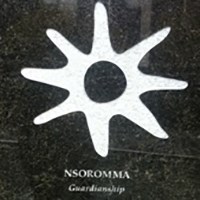
Nsoromma, meaning "children of the heavens" or "star," symbolizes the guardianship of God and how he watches over all beings. It is one of the many Adinkra symbols that the Ghanaian people have lived by. The protection of God is constant, like the stars in the universe. The stars also embody light, with the vision of light slicing through darkness as a savior, or protector. The symbol indicates the existence of the spiritual world, in which our ancestors and past families exist and watch over us, creating a feeling of safety and wholeness. Nsoromma expresses the message to live life to its fullest knowing that you are supported and strengthened by God.


Divinity of Mother Earth
Asase Ye Duru—literally meaning “the earth has no weight”—is a symbol that represents power, providence and divinity. The symbol is one of many adinkras, or depictions of important concepts created by the Akan peoples of Ghana. Asase Ye Duru emphasizes the importance of the Earth and its preservation. People must respect and nurture the Earth, and should never act in ways that might directly or indirectly harm the Earth. The significance of the Earth to the people of Ghana is evident in the following proverbs: Tumi nyina ne asase, meaning All power emanates from the earth; and Asase ye duru sen epo, meaning The earth is heavier than the sea. The African Burial Ground honors these principles, as it surrounds itself with natural resources and emphasizes the cohesion of death and nature.

#vodun#african traditional religions#panafrican thought#kemetic dreams#asase#duru#akan#earth#ghana#nso#nsoromma#children of the heavens#nkisi#nkisi sarabanda#bakongo#bakongo symbolism#gye#gye nyame#legba#new orleans voodoo#haitian vodou#brazil#trinidad#cuba#denise alvarado#obeah#kabbalistic#odinani#horus#set
147 notes
·
View notes
Text
By: Aaron Terrell
Published: Mar 29, 2024
I started speaking out about the dangers of medicalizing gender in 2019. I had spent the previous two years understanding the subculture that had grown around the notion of transgenderism. Apparently being “trans” was noble. Being “cis” meant you supported the white supremacist patriarchy. Apparently now gender dysphoria was a “cishet invention to pathologize transness”. Dysphoria was something you had to claim to have in order to access your “life saving” hormones and surgery. It was all foreign and confusing and full of contradictions. I felt like it made a mockery of my “real condition”. See I transitioned in 2010. Grateful for the relief it brought me and not interested in tribes or support groups, I got on with my life “as a man” and didn’t pay much mind to the culture of transition. That is until late 2017 when I re-immersed myself as a kind of religious studies student.
In addition to studying the culture that had arisen, I spent a lot of time reading stories from detransitioners. The detransitioners’ stories weren’t foreign or confusing. They sounded like my own. A lifelong sense of ‘supposed to be’ the opposite sex, and then learning this meant they were the opposite sex and transition was the only solution. Except it didn’t work. They felt more uncomfortable on the other side. Some felt like they were living a lie and presenting as the opposite sex was an act they no longer wanted to keep up; mentally, physically, or ethically. Unlike the aforementioned religious zealots, the detransitioners were easy to relate and empathize with.
So why did it work for me? And what does “work” even mean in this context? I have no idea. And certainly not for lack of trying to find the answer. I’ve now clocked over six yeas on a deep-dive into gender, dysphoria, detransition, sexology, psychology, etc. and I still don’t know. What I do know is there was no difference between us that could have been discerned by a “gender therapist” prior to transitioning, even back when things were “more careful”. The activists who came of age since 2010 are not just in the gender clinics, they are writing the guidelines for every therapist. They are told that to ask questions that might get to the root of someone’s gender related distress is “conversion therapy”. That “trans people” know what their gender is and to do anything but affirm them is akin to homophobia. We’re told detranisioners are just the rare few who were confused and got their gender wrong. While sad, sure, we shouldn’t weaponize them to punish “real” trans people.
So I am here as a “real trans person” to call bullshit. No one was “born in the wrong body” and sex trait modification is not “life saving care”. Some of us feel it was a net benefit, but recognize it was a serious medical intervention for what is a strictly psychological issue. There is no difference between a “trans person” and a “cis person” other than declared self-identity. If you are reading this, I’m fairly certain you agree. And yet, while attending the 2023 Trans Health Summit, I asked the trans and nonbinary 30 something doctors writing the American Psychological Association’s “Guidelines for Working with Trans and Gender Expansive Patients” how therapists can differentiate between a “trans child” and a “cis child”. I was told only a transphobe would even think to try.
In 2021, I began working with a friend and early gender clinic whistle-blower, Aaron Kimberly, who likewise does not regret transition. Together we launched the Gender Dysphoria Alliance and the Transparency Podcast. The aim of both is to shed light on the experience of gender dysphoria, without all the ideological noise that now surrounds it. Since then, we have gotten countless messages from parents, teachers, administrators, etc. thanking us for speaking out. Jamie Reed credited the podcast with helping her summon the courage to blow the whistle on her gender clinic. People have emailed us to say they decided not to transition or to detransition, crediting our content with them understanding their own motivations better. Mothers have told us their daughters dissisted after being shown the podcast. Personally I suspect that’s because most these girls have no interest in looking like middle-age men and being shown we aren’t cute K-Pop boys has them running from the testosterone. We’re happy to help either way!
However, we have also gotten criticism from Gender Critical activists who feel that by not detransitioning we are advertising transition. I would agree with them on this, if not for the fact of the culture we currently live in. The people with this criticism seem completely disconnected from the realities I described above. We live in a culture that celebrates all things trans while demonizing any investigation into it. There is no shortage of transition encouragement surrounding gender distressed individuals. What there is a shortage of is people telling them the truth from a position of compassion and empathy.
I am grateful to work alongside anyone productively working to interrupt this ideology. But just like how I didn’t need the trans tribes or support groups all those years ago, I don’t need gender critical ones now. If you don’t feel comfortable working with people who do not regret their transition, I completely understand where you’re coming from. I think it’s misguided strategically for the reasons I already mentioned, but I do understand it. I will keep writing and podcasting and trying to sound alarms, alone or with friends and colleagues, and I firmly believe the most productive way to do so is to continue to lean on my standing as a “trans person”.
#Aaron Terrell#Aaron Kimberly#Gender Dysphoria Alliance#queer theory#gender identity ideology#gender ideology#gender identity#intersectional feminism#religion is a mental illness
7 notes
·
View notes
Text
Need an OBGYN? Good luck finding one easily in a red state!
In conservative states, care delays largely stem from the fallout of the Dobbs decision last summer when the supreme court revoked the constitutional right to abortion. Facing possible lawsuits for providing abortion care, OB-GYNs in Texas, Florida, Idaho and elsewhere are choosing to relocate to more liberal states, while medical students are opting for other fields entirely.
“Florida has become a place where it is unsustainable to be an OB-GYN,” said Stephanie Ros, a maternal fetal medicine specialist at the University of South Florida who, until recently, ran the school’s OB-GYN residency program.
For years, the program was among the nation’s top schools for abortion training, and was found on the prestigious Ryan list of the best family planning residency programs. But after the state banned most abortions after six weeks of pregnancy, the designation was revoked. Applicant numbers subsequently declined dramatically, as skilled candidates took their talents elsewhere.
Ron DeSantis with his extremist agenda is turning Florida into a women's healthcare desert. Sadly, the same is also true in other states with hardline Republican governors.
In a national survey, 60% of medical students said they were unlikely to apply for residency in a restrictive state.
“States with stringent abortion laws won’t align with my goals as a future OB-GYN,” said Rohini Kousalya Siva, president of the American Medical Student Association. “If young doctors want to … get the skills they need, then they have to go to states where they can access [abortion] training.”
Verda J Hicks, president of the American College of Obstetricians and Gynecologists, described the trend as cause for concern about the “next generation of OB-GYNs”.
Notably, fewer residents means fewer doctors on the floor. To remedy that vacuum, USF hired locum doctors, who Ros described as “the substitute teachers of the doctor world”. Still, routine care appointments at USF are significantly pushed back. In August, the earliest a new patient could book a prenatal visit was November.
“We have people who … don’t get their first ultrasound until 30 weeks, because they just can’t get in,” she said.
[ ... ]
When chronic diseases are not managed as well, the overall risk of any pregnancy goes up, explained Erika Werner, chair of obstetrics and gynecology at Tufts medical center in Boston. “If you don’t have your first visit until 14 weeks, you don’t have the same access to prenatal testing. You may not have an early ultrasound that reveals a major structural problem,” she said.
It's ironic that Republicans are eager to turn women into baby making machines but are making it impossible to get proper prenatal care.
Women seeking reproductive care are heading to blue states and are putting a strain on services there.
Even parts of the country without abortion bans are struggling to keep up with care needs. Christina Han, the director of maternal fetal medicine at UCLA in California, pointed to the influx of out-of-state patients seeking abortion care and how it stretches the workforce thin.
Han specializes in complex procedures like multifetal reduction – an operation that must be completed early in pregnancy. That time crunch means that if a patient travels to LA for urgent reproductive care, which Han says is happening with increased frequency, the hospital has to defer local patients’ scheduled operations, including terminations, that are not as time sensitive.
“We have to tell our patient who is struggling with a miscarriage … that we just can’t get them in. And that is an emotional, physical burden for these patients,” said Han.
Werner, who also chairs the Society for Maternal Fetal Medicine’s health policy and advocacy committee, explained that this displacement effect is especially pronounced in states that directly border those with restrictive policies, and are now receiving the lion’s share of out-of-state patients.
In Pennsylvania, which borders West Virginia, Stolfer remembers thinking about women in other states as she awaited care for her miscarriage. “It was one way that I was trying to make peace with how long it was taking,” she said.
Being an OBGYN was stressful even before the Republican SCOTUS decision in Dobbs v. Jackson Women's Health Organization.
For years, studies have predicted that population rise paired with an ageing workforce would lead to gaps in women’s healthcare. Ruth Crystal of Stanford University also points to the high risk for medical malpractice litigation and demands for long and irregular hours as factors that steer people away from the field.
“OB care is a 24-hour-a-day job,” she said. “Babies don’t come only between banking hours.”
So Republicans have made an already difficult job nearly impossible in some areas. As a result, maternal mortality rates are growing in the African-American community.
Nationwide, 36% of counties are maternity care deserts, meaning they lack any obstetric care facilities or providers, explains Amanda Williams, clinical innovations adviser at Stanford University’s California Quality of Care Collaborative. The affected populations are also disproportionately people of color, people with lower incomes and people in rural areas – groups that already face care inequities.
In the US, Black women are experiencing soaring maternal mortality rates.
“All of these things compound for poor maternal health outcomes,” said Williams. “When patients give birth in these maternity deserts, they have higher rates of preterm births and maternal deaths.”
[ ... ]
Werner believes the most critical fix is abolishing restrictive abortion laws and creating “parity across all states”.
“It’s only when it comes to OB-GYN care that what you can get in one state is different than what you can get in another,” she said. “That just forever means that we’re going to have unequal care in different states.”
#dobbs v. jackson women's health organization#obgyn#shortage of obgyns in red states#women's healthcare#abortion#florida#republicans#the gop#the republican scotus#a woman's right to choose#the sanctity of reproductive freedom
25 notes
·
View notes
Text
UNIQUE PERSONNEL PROFILE
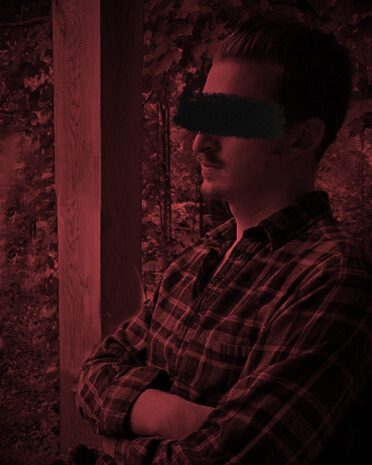
Demographics
Name: Calvin Lucien
Age: 39
Sex/Gender: Male
Country of Origin: The United States of America
Occupation: Special Agent of the Chaos Insurgency
Physical Appearance
Eye color: Brown
Skin color: White
Hair color: Brown
Height: 6’ 1
Weight: 190 lbs
Body type: Athletic
Fitness level: High
Tattoos: Chaos Insurgency Logo on the right shoulder, as is common with Chaos Insurgency personnel.
Scars/Birthmarks: Scar on the left cheek, running from the bottom of the left eye to the left side of his jaw
Disabilities: N/a
Clothing: Black and red plaid jacket, black long-sleeved shirt, black combat pants, black combat boots, black leather fingerless gloves.
Accessories: Nothing of note.
History
Birth date: November 15, 1985
Place of birth: Wisconsin, USA
Key family members:
Uncle: O5 councilman Gabriel Lucien, aka The Blackbird.
Grandmother:
Affiliations: SCP Foundation (former), Chaos Insurgency (current)
Psychological Traits
Personality type: ISTJ
Personality traits: Reserved, Calculating, Adaptable
Temperament: Melancholic
Introvert/Extrovert: Introverted
Mannerisms: Observant, speaks deliberately
Educational background: Graduate of Foundation Task Force Training Program
Intelligence: High
Self-esteem: Mid
Hobbies: Cryptography, Chess, Mixed Martial Arts
Skills/talents: Hand-to-hand combat, High Strategical Intelligence
Morals/Virtues: Sacrifice for a greater good.
Phobias/Fears: Atychiphobia
Flaws: Emotionally Distant, Trust Issues, Vulnerable to Emotional Manipulation
Communication
Languages known: English, Russian, Japanese, Polish
Accent: Neutral American
Pitch: Moderate and Controlled
Laughter: Subdued Chuckle
Smile: Reserved
Strengths, Weaknesses, and Abilities
Physical strengths: Exceptional Agility and Reflexes
Physical weaknesses: Susceptible to Overexertion, Tends to Push Limits
Intellectual strengths: High Strategic Intelligence
Intellectual weaknesses: Tends to Overthink
Interpersonal Strengths: A Good Leader
Interpersonal weaknesses: Prefers Working Alone
Magical abilities: N/a
Relationships
Lover(s): N/a
Parents/Guardians:
Jonathan Lucien (Father)[deceased]
Elizabeth Lucien (Mother)[deceased]
Children: N/a
Grandparents:
Edward Lucien (Grandfather)[deceased]
Evelyn Lucien (Grandmother)[deceased]
Grandchildren: N/a
Pets: N/a
Friends: Few if Any
Enemies: SCP Foundation, Three Moons Initiative, Serpents Hand, Global Occult Coalition
Mentors/Teachers:
Special Agent “Specter”
Special Agent “Whisper”
Character
Inspiration: The Punisher
Character archetype: Anti-Hero
Core values: His Version of Justice, Revenge
Goals: To murder the O5 Council
Motivations: To avenge his family’s murder at the hands of the O5 Council.
Additional Information
Calvin Lucien is a high threat to the Foundation and its goals. As a boy, nearly his entire family was murdered by the O5 Council due to learning confidential secrets. The only ones not confirmed dead were Calvin and his grandmother Evelyn, with his younger sister Eliza said to be missing. His grandmother raised him until her death when Calvin was 12. For the following years, Calvin switched between several foster homes, eventually becoming curious about the occult. When he was 18, he joined the military, excelling particularly at all physical programs. After another few years, he was nominated to join Mobile Task Force Alpha 1, aka the Red Right Hand.
However, on one mission, Calvin was kidnapped by the Chaos Insurgency, once a group comprised of ex-Red Right-Hand members that had grown exponentially. There was when Calvin learned the truth of his family’s murder, that the O5 Council had them slaughtered to preserve secrecy. Enraged, Calvin left the Foundation right then and joined the Chaos Insurgency as both military personnel and Foundation intelligence.
Addendum 1
Recent information has revealed that Calvin and close associates have been planning a visit to Iraq. As nearly all in the Foundation know, the major anomaly located in that area is The Gate Guardian. However, as nearly none know, it is also where ᗩᕲᗩᘻ ᒪᓰᐺᘿS the former O5-12 went missing. After ᕼᘿ ᘺᗩS Sᘿᗩᒪᘿᕲ ᗩᘺᗩᖻ his retirement, he was never seen again, though there is strong speculation that he retreated to the area in which The Gate Guardian protects. It is also theorized that the reason for Calvin’s increased specialty training is for some “Hail Mary” against the foundation.
Note
"Let it be known that whoever is leaking classified information in these documents will be found and subject to immediate termination." -The Administrator
#multiverse tales#popcross studios#scp foundation#12's multiverse#calvin lucien#chaos insurgency#character profile
6 notes
·
View notes
Text

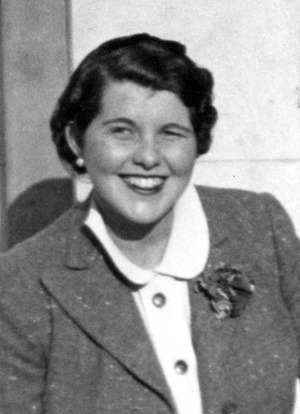
The Secret Lobotomy of Rosemary Kennedy
On September 13, 1918, Rose Kennedy, wife of prominent businessman Joseph Kennedy Sr., went into labor with her third child. Rose's obstetrician was called to the Kennedys' home, but with a pneumonia epidemic raging through Boston, he failed to arrive before the baby entered the birth canal. A nurse, desperate to stop the delivery until the doctor arrived, held Rose's legs closed. When that failed, she reached into Rose's birth canal and held the baby's head in place for an unbelievable two hours.
In the quickly expanding household of boisterous, competitive Kennedys, Rosemary was often left behind. She was held back in school, until finally Rose hired private tutors for Rosemary and kept her at home. Watching her brothers and sisters go out without her left Rosemary angry and confused. She had "fits," which could have been seizures or episodes of mental illness. Afraid of Rosemary's vulnerability, Rose never let her leave the house alone. Rosemary also often ran away.
In the 1920s, the stigma associated with mental disability could ruin a family. Many Americans, including prominent members of society like Teddy Roosevelt, Andrew Carnegie, and John D. Rockefeller, believed in eugenics, a pseudoscience that advocated for forced sterilization of the "defective," a group that included the mental and physically disabled. And then, of course, the Kennedys were devout Catholics, whose church deemed disability the result of sin—a punishment from God.
Rosemary's disability was a challenge her mother couldn't face alone. At age 11, Rosemary was sent to boarding school. Over the next nine years, she attended five different schools. Her letters home show a young girl struggling to get it right. She wrote in a childish script that slants down dramatically off the page. She misspelled words and wrote incomplete sentences. Each letter is filled with a daughter's a desperate desire for approval and affection.
While in Britain, Rosemary found brief respite. She was enrolled in Belmont House, a boarding school run by Catholic nuns who embraced the Montessori Method of education, which focused on learning through practical skills and hands-on activities. Rosemary flourished under the guidance of the nuns, who trained her to be a teacher's aide. But after the Germans marched on Paris in the summer of 1940, her family brought her back to the States. Rosemary's reprieve was over.
Back at home, Rosemary watched her siblings begin their lives and careers, while she wasn't even allowed outside alone. Rose tried to find another school for her daughter, but few places were equipped to take a disabled adult in her 20s. Rosemary was eventually sent to a convent, where she began sneaking out at night and going to bars.
Joe Sr. was busy plotting the political career of his two oldest sons. Wanting to avoid scandal and looking to find a cure for his daughter's erratic behavior, he began speaking to Dr. Walter Freeman and his associate Dr. James Watts, the leading practitioners of lobotomies in America. At the time, the procedure was heralded as a cure for the physically disabled and mentally ill..
Joe Sr. discussed the procedure with Rose, who asked their daughter Kathleen to look into it. Kathleen spoke with a reporter, John White, investigating mental illness and treatments. White told Kathleen that the effects of lobotomies were "no good." Clifford Larson writes that Kathleen immediately reported back to her mother: "Oh, Mother, no, it's nothing we want done for Rosie." But whether out of desperation or determination, Joe Sr. went ahead with the surgery.
At the age of 23, Rosemary was admitted to George Washington University Hospital, where she was strapped to a table and given an anaesthetic to numb the areas of her brain where Freeman and Watts would drill two small holes. They then inserted a small metal spatula and sliced the connections between her pre-frontal cortex and the rest of her brain. (Freeman often used ice picks for the procedure, hammering the pick in through the eye socket.) Rosemary was wide awake the whole time. The doctors had her recite poems as they cut—when she was silent, they knew the procedure was complete.
The hope was that the procedure would subdue Rosemary and end her rebellious jaunts about town. But the result was far more extreme: After the lobotomy, Rosemary was no longer able to walk or talk. It took months of therapy before she regained the ability to move on her own, recouping only the partial use of one arm. One of her legs was permanently turned inward. Months after the surgery, when she regained her ability to speak, it was a mix of garbled sounds and words. The result must have been shocking to Joe Sr., who had clung to the procedure as his last hope for Rosemary. But it couldn't have shocked Dr. Freeman, who had no surgical training and no proof of the astounding results he had claimed.
Immediately after the surgery, Joe Sr. moved Rosemary to Craig House, a psychiatric care facility where Zelda Fitzgerald once stayed. At the end of the 1940s, Joe Sr. had her moved to Saint Coletta's, a residential care facility in Jefferson, Wisconsin, where Rosemary lived until her death in 2005.
For 20 years, Rosemary was hidden from her family.
In 1961, Joe Sr. suffered a stroke, and in early 1962, Rose finally saw her daughter again. Koehler-Pentacoff, whose aunt was one of Rosemary's primary caretakers at Saint Coletta's, recalls being told that during their first meeting, Rosemary attacked her mother. Angry, wounded, and abandoned, Rosemary was fighting for herself.
Twenty years after the barbaric procedure that derailed Rosemary's life, the Kennedys began to fight for her too. Rosemary's sister Eunice Kennedy Shriver founded the Special Olympics in 1968 and became a leading advocate for disability rights. Rosemary's nephew Anthony Shriver became an activist for people with developmental disabilities and founded the non-profit Best Buddies International. Rosemary's older brother John F. Kennedy, who became the 35th president of the United States, signed the Maternal and Child Health and Mental Retardation Planning Amendment to the Social Security Act, the first major legislation to combat mental illness and retardation, in 1963. It was a precusor to the American's with Disabilities Act, which Rosemary's little brother Ted—who served as a Democratic Senator for Massachusetts from 1962 until his death in 2009—championed. (It was eventually made law in 1990.) Ted Kennedy also sat on the board of the American Association of People with Disabilities.
14 notes
·
View notes
Text

#BlackWomensHistoryMonth : Octavia Butler was committed her life to turning speculative fiction into a home for Black expression. She became the first Black women science fiction author to be granted a MacArthur fellowship, and the first Black woman to win Hugo and Nebula awards.
Octavia Estelle Butler was born in Pasadena, California where as a little girl, she struggled with dyslexia while attending public school. Her teachers interpreted her slower reading as an unwillingness to do the work rather than a sign of her struggles with dyslexia. When she was given books to read in school, she found them boring and unrelatable but was interested in going to the library and reading unique stories. She had an endless appetite for stories and frequently made up her own while sitting on her grandmother’s porch. by the time she was ten she could be found carrying around a large notebook, writing down stories whenever she got a free moment. Whenever she wrote stories for school, they were so unusual that many of her teachers assumed she had copied them from published works. One teacher recognized her talents and encouraged the then 13-year-old Butler to submit one of her stories to a science fiction magazine for publication. That submission was the first of many and solidified her desire to—and her belief that she could—become a professional writer.
In 1968, Butler graduated from Pasadena City College with an Associate's Degree. She then continued taking classes, first at California State University in Los Angeles and then at the University of California at Los Angeles. She took writing classes but also studied anthropology, psychology, physics, biology, and geology, among other subjects and workshops. While attending The Screen Writers’ Guild Open Door Program, Octavia had sold her first two stories. Despite her success with the short stories, she struggled to get other stories published. After a series of rejections, she shifted gears and tried to write her first novel. That first manuscript was purchased by Doubleday and published in 1976.
In 1979, Octavia wrote 12 more books including ‘Kindred’. She often said she was inspired to write ‘Kindred’ when she heard young African Americans minimize the cruelty and severity of enslavement. She wanted younger readers to know not only the facts of enslavement but what it felt like, making sure to humanize those who survived the exploitative institution. ‘Kindred’ is now a mainstay in many high school and college classrooms.
Octavia won numerous prestigious awards for her writing. In 1995, she was awarded a MacArthur “Genius” Grant—the only science fiction writer to receive this award. She won Nebula and Hugo Awards, the two highest honors for science fiction, a PEN Lifetime Achievement Award, and the City College of New York’s Langston Hughes Medal in 2005. As a pioneer in science fiction, she opened up the genre to many other African American and female writers. Today, her influence spans literature, genres and media. “Do the thing that you love and do it as well as you possibly can and be persistent about it.” - Octavia Butler
5 notes
·
View notes
Text
South Park characters college/university majors head cannons
Stan - he would either not go to college at all, and try to purse a career in music by playing at dive bars & gigs, OR he go into college probably undecided then major in veterinary science or marine biology but then realizes it’s not just loving on animals all day so he’ll drop out & go back to music but still volunteers at the humane society & has like a bunch of pets.
Kyle - pre law with entertainment business minor, wants to work in entertainment/film but was too scared to major in film out right, but is in the film club, and makes movies with them all the time. He’s also in SGA, and fights the board of trustees to give the arts more funding.
Cartman- He went to college for a semester majored in business but then flunked out but still tells people he has a degree, bc he “knows how to run a business” and works as a sleazy used car salesman, has to skip town a lot to avoid the fuzz.
Kenny - he goes into the military to afford college, and once he gets there he majors in finance & accounting so he can afford to care for his siblings. He went into the Air Force, because wanted to learn how to fly a plane lol.
Butters - Business & then gets his MBA, and starts up some sort of pyramid scheme. Think like Cutco Knives (iykyk) OR he majors in elementary ed, and minors in psychology to be a counselor at South Park Elementary. He tried to rush a frat, but wouldn’t make it past pledging.
Tweek- Double majoring in music and education, and technically says he is minoring in business just so his parents are happy but he really isn’t. He wants to become a music teacher. I think he’s in a music frat and takes Craig to their formals & date parties.
Craig - Mechanical Engineering for undergrad and then goes to get his masters in aerospace engineering, wants to build rockets and shit for NASA. He is so swapped with assignments, he practically lives in the library, he rlly doesn’t have time for clubs or greek life, so he just studies and when he isn’t studying he’s with Tweek or sleeping , when he parties which is rare, he almost always gets blacked out drunk. Everytime.
Tolkien - pre law with a minor in sport’s management, wants to become a sports agent. He’s in a frat but isn’t a total douche bag abt it, and in SGA with Kyle, overall really popular. Still plays bass and jams out with Stan from time to time. Ideal golden child college experience.
Jimmy - Acting, but drops out and moved to LA to pursue his comedy career. He liked college but decided it was a waste of money. When he could be getting more a real life experience. Still will go a frat party though
Clyde - Physical Education, he didn’t get any sports scholarships and decided that this was the best career route for him, he also ends up working at South Park elementary. He is a BIG frat guy lol, parties everyday. He is trying to get Craig to rush his frat. He is failing at this task.
Wendy - Pre Med with a minor in psychology, wants to be a children’s psychiatrist, and she SLAYS. She also joins a sorority but in an Elle Woods sort of way. I feel like she did her residency in San Francisco, and then sort of adapted that as her full personality.
Bebe - Journalism, wants a to be a news anchor. She is ur classic sorority girl, probably president, it’s giving Chanel vibes from Scream Queens but she way nicer, but will cut a bitch to further her career.
SGA = Student Government Association ( for my high school & Non American friends )
I’m currently in undergrad so these head-cannons are straight from my real life ahaha
10 notes
·
View notes